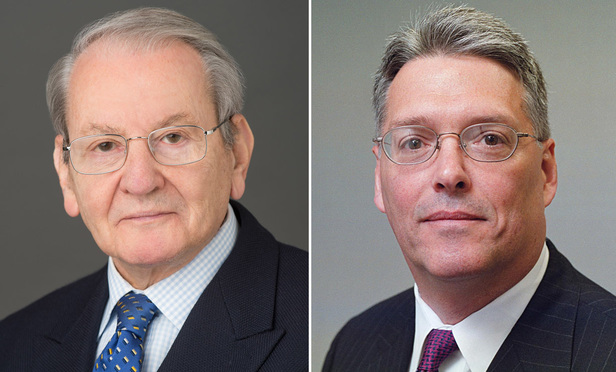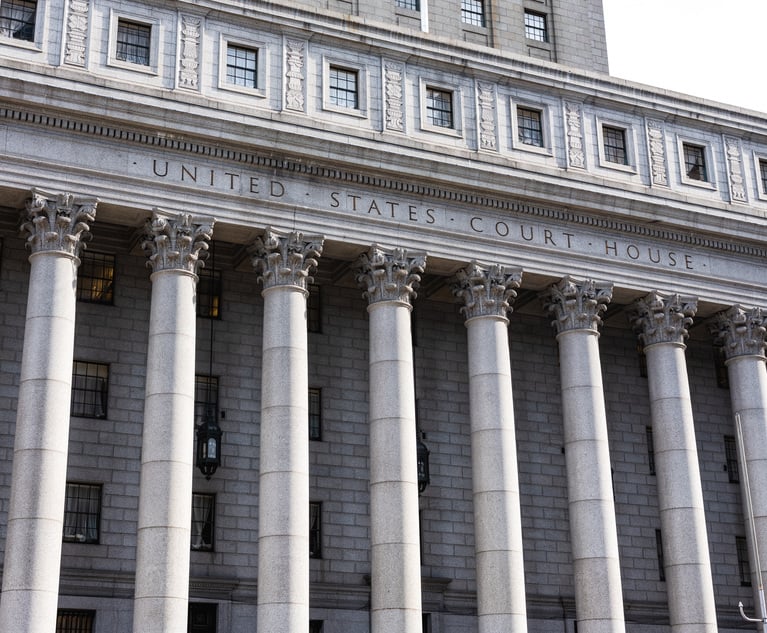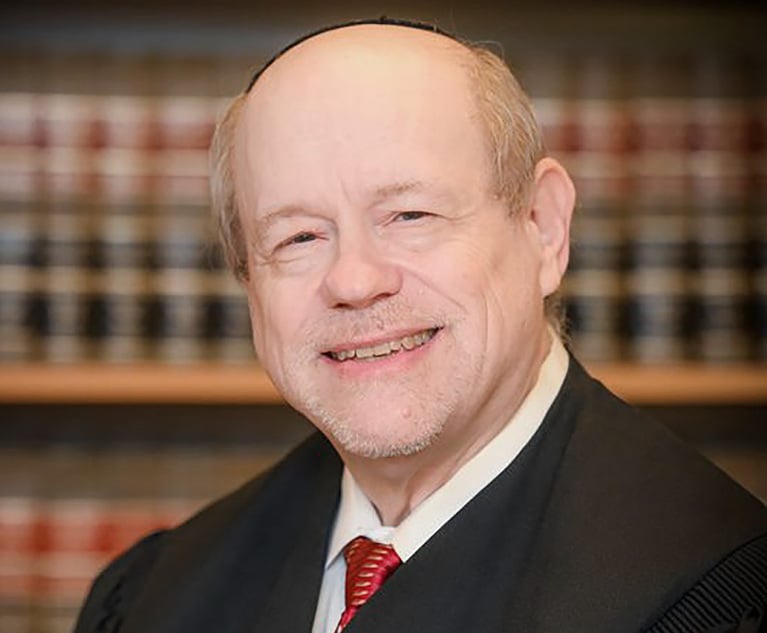The Principle of Party Presentation
In their Appellate Practice column, Thomas R. Newman and Steven J. Ahmuty Jr. discuss the Sineneng-Smith case, where the U.S. Supreme Court rebuked the Ninth Circuit for unilaterally injecting an entirely new substantive issue into a case that had already been briefed, argued and submitted for decision.
June 30, 2020 at 12:15 PM
9 minute read
 Thomas R. Newman and Steven J. Ahmuty Jr.
Thomas R. Newman and Steven J. Ahmuty Jr.
Under the principle of party presentation, courts rely on the parties to formulate the issues in a case. This principle rests on the premise that competent counsel, acting as advocates, are best suited to select, frame and argue the issues for decision on their clients' behalf. Conversely, the courts, acting as neutral arbiters, normally decide only the issues presented by the parties.
In United States v. Sineneng-Smith, ___ U.S. ___, 140 S. Ct. 1575, 2020 U.S. Lexis 2639, decided May 7, 2020, the U.S. Supreme Court rebuked the Court of Appeals for the Ninth Circuit for unilaterally injecting an entirely new substantive issue into a case that had already been briefed, argued and submitted for decision, selecting amicus curiae to brief and argue this newly injected issue, and then adjudicating the appeal solely on the basis of this new issue.
In an opinion by Justice Ruth Bader Ginsburg, the court unanimously held that "the appeals panel departed so drastically from the principle of party presentation as to constitute an abuse of discretion." See 140 S. Ct. at 1578. The court vacated the Ninth Circuit's judgment and remanded the case "for an adjudication of the appeal attuned to the case shaped by the parties rather than the case designed by the appeals panel." Id. This decision reinforces the general principle that the contours of a case are shaped by the parties, not the courts.
Appellate Panel's 'Takeover' of Appeal
Evelyn Sineneng-Smith operated an immigration consulting business in California. She assisted clients who were unlawfully present in the United States in filing applications for a discontinued Department of Labor certification program that had once provided a path for noncitizens to obtain lawful permanent resident status to live and work in the United States. Sineneng-Smith knew the application-filing deadline for this program had long since expired, and thus the applications were futile, but she nevertheless charged her clients sizable fees for filing this paperwork, netting her millions of dollars.
Insofar as relevant here, Sineneng-Smith was indicted in federal district court for multiple violations of 8 U.S.C. §1324(a)(1)(A)(iv), which makes it unlawful to "encourage[] or induce[] an alien to come to, enter, or reside in the United States, knowing or in reckless disregard of the fact that such coming to, entry, or residence is or will be in violation of law," and section 1324(a)(1)(B)(i), which carries an enhanced penalty when the crime is committed "for the purpose of commercial advantage or private financial gain."
Sineneng-Smith filed a pre-trial motion to dismiss in the district court, arguing that Section 1324 did not apply to her conduct, but if it did, then it violated the Petition and Free Speech Clauses of the First Amendment as applied. Specifically, she argued that: (1) her conduct in assisting noncitizens with labor certifications did not violate Section 1324 because she had not "encouraged or induced" them to remain in the country unlawfully; (2) clause (iv) was unconstitutionally vague; (3) Section 1324 constituted a content-based restraint on her speech; and (4) she had a constitutional right to file applications on her clients' behalf under the Petition and Free Speech Clauses of the First Amendment, which provide that "Congress shall make no law … abridging the freedom of speech … or the right of the people … to petition the Government for a redress of grievances."
Though represented by competent counsel, Sineneng-Smith never argued, in words or substance, that Section 1324 was facially overbroad or infringed on the constitutionally protected speech of others (her clients). Rather, her First Amendment arguments focused on her own conduct.
The district court denied Sineneng-Smith's motion to dismiss, reasoning that she had "encouraged" her clients to remain in the country unlawfully, within the meaning of section 1324, by tricking them into believing that the applications filed on their behalf would lead to lawful permanent resident status. The court also rejected Sineneng-Smith's First Amendment arguments, as framed in her motion, reasoning that she was not being prosecuted for making the applications themselves, but for fraudulently representing to her clients, for financial gain, that the applications would lead to lawful status.
Sineneng-Smith was convicted at trial on the Section 1324 charges. She filed a post-trial motion for a judgment of acquittal, in which she renewed, almost verbatim, the arguments in her motion to dismiss. After the denial of this motion, she appealed her conviction to the Court of Appeals for the Ninth Circuit. On appeal, her counsel's briefs and oral argument rehashed the arguments in her district court motions.
Instead of deciding the appeal on the arguments presented by the parties, the Ninth Circuit threw a curve ball several months after oral argument by inviting three organizations—the Ninth Circuit Federal Defenders, the Immigrant Defense Project and the National Lawyers' Guild National Immigration Project—to file amicus curiae briefs on, among other things, the issue of whether "[Section 1324] is overbroad or likely overbroad under the First Amendment," an argument Sineneng-Smith had never presented at any stage of the proceedings. Counsel for the parties, who were relegated to a secondary role in this "do-over," were permitted to "respond" to the arguments in the amici briefs. (Understandably, Sineneng-Smith's supplemental brief adopted the amici's overbreadth arguments.) And, while the amici were allotted 20 minutes for re-argument of the appeal, Sineneng-Smith's counsel was limited to 10 minutes. This, the Supreme Court would eventually hold, amounted to a "takeover of the appeal." See 140 S. Ct. at 1577.
Casting aside the parties' arguments, the Ninth Circuit relied on the amici's overbreadth theory to facially invalidate section 1324(a)(1)(A)(iv). See 910 F.3d 461, 485 (2018). The court of appeals reversed the Section 1324(a) convictions, vacated the sentence, and remanded for resentencing on unrelated charges to which Sineneng-Smith had pleaded guilty. After granting the Government's petition for certiorari, the Supreme Court vacated the Ninth Circuit's judgment and remanded the case for a decision confined to the issues presented by the parties.
Abuse of Discretion
The Supreme Court began its analysis by citing Greenlaw v. United States, 554 U.S. 237 (2008), another opinion by Justice Ginsburg, in which the court held that because the Government had neither appealed nor cross-appealed, the Eighth Circuit erred in vacating petitioner Greenlaw's 37-year sentence and imposing a 52-year sentence based upon a self-evident sentencing error by the district court. As noted in Greenlaw and reiterated in Sineneng-Smith, "in both civil and criminal cases, in the first instance and on appeal … [courts] rely on the parties to frame the issues for decision and assign to courts the role of neutral arbiter of matters the parties present." See 140 S. Ct. at 1579, citing Greenlaw, 554 U.S. at 234. While courts in criminal cases may depart from this principle of party presentation to protect a pro se defendant's rights, our adversarial system of adjudication generally "is designed around the premise that [parties represented by competent counsel] know what is best for them, and are responsible for advancing the facts and argument entitling them to relief." See 140 S. Ct. at 1579 (citation omitted).
Writing that courts "are essentially passive instruments of government," Justice Ginsburg observed that "[t]hey do not, or should not, sally forth each day looking for wrongs to right. [They] wait for cases to come to [them], and when [cases arise, courts] normally decide only questions presented by the parties." See 140 S. Ct. at 1579 (citation omitted).
This is not to say, however, that the principle of party presentation is ironclad. Justice Ginsburg acknowledged that "[t]here are no doubt circumstances in which a modest initiating role for a court is appropriate." See 140 S. Ct. at 1579 (citation omitted). In an addendum to the opinion, the court listed cases in which it had requested supplemental briefing from the parties or appointed amicus curiae in recent years. For example, the court had sought supplemental briefing (1) "to determine whether a case presented a controversy suitable for the Court's review"; (2) "to clarify an issue or argument the parties raised"; and (3) "on a constitutional issue implicated, but not directly presented, by the question on which [the court] granted certiorari," but only where "the parties had raised the relevant constitutional challenge in lower courts [and] the question was not interjected into the case for the first time by an appellate forum." See 140 S. Ct. at 1582 (citations omitted). The court had appointed amicus curiae (1) "to present argument in support of the judgment below when a prevailing party has declined to defend the lower court's decision or an aspect of it" and (2) "to address the Court's jurisdiction to decide the question presented." See id. at 1582-83 (citations omitted).
Although courts are "not hide-bound by the precise arguments of counsel … the Ninth Circuit's radical transformation of the case goes well beyond the pale," the court held (see 140 S. Ct. at 1581-82), especially since Sineneng-Smith's First Amendment arguments consistently centered on her own conduct, not that of her clients. Consequently, the court vacated the Ninth Circuit's judgment and remanded the case "for reconsideration shorn of the overbreadth inquiry interjected by the appellate panel and bearing a fair resemblance to the case shaped by the parties." See id. at 1582.
Justice Clarence Thomas wrote a concurring opinion in which he not only agreed that the Ninth Circuit had abused its discretion in reaching out to decide whether Section 1324(a)(1)(A)(iv) is unconstitutionally overbroad, but also expressed doubts about the overbreadth doctrine itself. Specifically, Justice Thomas stated "[i]t appears that the overbreadth doctrine lacks any basis in the Constitution's text, violates the usual standard for facial challenges, and contravenes traditional standing principles." See 140 S. Ct. at 1583. The court may have been disinclined to address this overbreadth issue in the context of the Sineneng-Smith matter, and thus it seized upon the Ninth Circuit's unusual procedural maneuver to leave open the option of resolving this issue in an appropriate case.
Thomas R. Newman is of counsel to Duane Morris and author of "New York Appellate Practice" (Matthew Bender). Steven J. Ahmuty Jr. is retired from Shaub, Ahmuty, Citrin & Spratt. They are members of the American Academy of Appellate Lawyers.
This content has been archived. It is available through our partners, LexisNexis® and Bloomberg Law.
To view this content, please continue to their sites.
Not a Lexis Subscriber?
Subscribe Now
Not a Bloomberg Law Subscriber?
Subscribe Now
NOT FOR REPRINT
© 2025 ALM Global, LLC, All Rights Reserved. Request academic re-use from www.copyright.com. All other uses, submit a request to [email protected]. For more information visit Asset & Logo Licensing.
You Might Like
View All
Decision of the Day: Qui Tam Relators Do Not Plausibly Claim Firm Avoided Tax Obligations Through Visa Applications, Circuit Finds

'Serious Legal Errors'?: Rival League May Appeal Following Dismissal of Soccer Antitrust Case
6 minute read
Decision of the Day: Judge Sanctions Attorney for 'Frivolously' Claiming All Nine Personal Injury Categories in Motor Vehicle Case

Law Firms Mentioned
Trending Stories
Who Got The Work
J. Brugh Lower of Gibbons has entered an appearance for industrial equipment supplier Devco Corporation in a pending trademark infringement lawsuit. The suit, accusing the defendant of selling knock-off Graco products, was filed Dec. 18 in New Jersey District Court by Rivkin Radler on behalf of Graco Inc. and Graco Minnesota. The case, assigned to U.S. District Judge Zahid N. Quraishi, is 3:24-cv-11294, Graco Inc. et al v. Devco Corporation.
Who Got The Work
Rebecca Maller-Stein and Kent A. Yalowitz of Arnold & Porter Kaye Scholer have entered their appearances for Hanaco Venture Capital and its executives, Lior Prosor and David Frankel, in a pending securities lawsuit. The action, filed on Dec. 24 in New York Southern District Court by Zell, Aron & Co. on behalf of Goldeneye Advisors, accuses the defendants of negligently and fraudulently managing the plaintiff's $1 million investment. The case, assigned to U.S. District Judge Vernon S. Broderick, is 1:24-cv-09918, Goldeneye Advisors, LLC v. Hanaco Venture Capital, Ltd. et al.
Who Got The Work
Attorneys from A&O Shearman has stepped in as defense counsel for Toronto-Dominion Bank and other defendants in a pending securities class action. The suit, filed Dec. 11 in New York Southern District Court by Bleichmar Fonti & Auld, accuses the defendants of concealing the bank's 'pervasive' deficiencies in regards to its compliance with the Bank Secrecy Act and the quality of its anti-money laundering controls. The case, assigned to U.S. District Judge Arun Subramanian, is 1:24-cv-09445, Gonzalez v. The Toronto-Dominion Bank et al.
Who Got The Work
Crown Castle International, a Pennsylvania company providing shared communications infrastructure, has turned to Luke D. Wolf of Gordon Rees Scully Mansukhani to fend off a pending breach-of-contract lawsuit. The court action, filed Nov. 25 in Michigan Eastern District Court by Hooper Hathaway PC on behalf of The Town Residences LLC, accuses Crown Castle of failing to transfer approximately $30,000 in utility payments from T-Mobile in breach of a roof-top lease and assignment agreement. The case, assigned to U.S. District Judge Susan K. Declercq, is 2:24-cv-13131, The Town Residences LLC v. T-Mobile US, Inc. et al.
Who Got The Work
Wilfred P. Coronato and Daniel M. Schwartz of McCarter & English have stepped in as defense counsel to Electrolux Home Products Inc. in a pending product liability lawsuit. The court action, filed Nov. 26 in New York Eastern District Court by Poulos Lopiccolo PC and Nagel Rice LLP on behalf of David Stern, alleges that the defendant's refrigerators’ drawers and shelving repeatedly break and fall apart within months after purchase. The case, assigned to U.S. District Judge Joan M. Azrack, is 2:24-cv-08204, Stern v. Electrolux Home Products, Inc.
Featured Firms
Law Offices of Gary Martin Hays & Associates, P.C.
(470) 294-1674
Law Offices of Mark E. Salomone
(857) 444-6468
Smith & Hassler
(713) 739-1250






